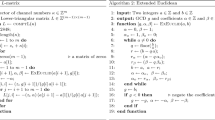Abstract
The concept of optimal filtering of observations collected with a dual frequency GPS P-code receiver is investigated in comparison to an approach for C/A-code units. The filter presented here uses only data gathered between one receiver and one satellite. The estimated state vector consists of a one-way pseudorange, ionospheric influence, and ambiguity biases. Neither orbit information nor station information is required. The independently estimated biases are used to form double differences where, in case of a P-code receiver, the wide lane integer ambiguities are usually recovered successfully except when elevation angles are very small. An elevation dependent uncertainty for pseudorange measurements was discovered for different receiver types. An exponential model for the pseudorange uncertainty was used with success in the filter gain computations.
Similar content being viewed by others
References
Gelb, A (editor), (1979) Applied Optimal Estimation, M.I.T. Press, Cambridge, Massachusetts and London, England.
Goad, CC (1985), Precise Relative Position Determination Using Global Positioning System Carrier Phase Measurements in a Nondifference Mode, Proceedings of the First International Symposium on Precise Positioning with the Global Positioning System, Rockville, Maryland.
Goad, CC (1990) Optional Filtering of Pseudoranges and Phases from Single Frequency GPS Receivers, Vol. 37, No. 3, 249–262,Navigation.
Hwang, PYC (1990), Kinematic GPS: Resolving Integer Ambiguities on the Fly, Proceedings of the IEEE 1990 Position, Location, and Navigation Symposium, March 21–23, Las Vegas, Nevada.
Loomis, P (1989), A Kinematic GPS Double-Differencing Algorithm, 5th International Geodetic Symposium on Satellite Positioning, Las Cruces, New Mexico.
Klobuchar, J (1976) Ionospheric Time Delay Corrections for Advanced Satellite Ranging Systems, AGARD Conference Proceedings No. 209 on Propagation Limitations of Navigation and Positioning Systems, NATO, Istanbul, October 20–22, 1976.
Morrison, N (1969) Introduction to Sequential Smoothing and Prediction, McGraw-Hill Book Company, New York.
Author information
Authors and Affiliations
Rights and permissions
About this article
Cite this article
Eueler, HJ., Goad, C.C. On optimal filtering of GPS dual frequency observations without using orbit information. Bulletin Géodésique 65, 130–143 (1991). https://doi.org/10.1007/BF00806368
Received:
Accepted:
Issue Date:
DOI: https://doi.org/10.1007/BF00806368




